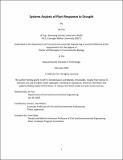Systems Analysis of Plant Responses to Drought
Author(s)
Yun, Jie
DownloadThesis PDF (21.45Mb)
Advisor
Des Marais, David L.
Terms of use
Metadata
Show full item recordAbstract
Understanding how plants respond to environmental stress is critical for ensuring stable crop performance and predicting how natural populations may adapt to a changing climate. While plant biology has traditionally focused on plant physiology and molecular biology of model plants to elucidate plant responses, there is immense diversity in how plants respond to environmental conditions, arising from complex genotype-by-environment interactions (GxE).
This dissertation investigates these themes, aiming to advance our understanding of the mechanisms driving plant responses to environmental stress and providing insights for improving agricultural resilience and sustainability, as well as contributing to evolutionary biology. This thesis focuses on three projects:
(1) While GxE is widely observed in traits and gene expression patterns, the mechanisms driving these interactions remain unclear. This thesis will present a framework using casual inference to study GxE interactions in gene regulatory networks to uncover the molecular mechanisms driving diverse environmental responses. We study two genotypes of the model grass species Brachypodium distachyon, leveraging natural variation and RNA-sequencing to study their responses to drought stress.
(2) Natural perturbations can be used to understand complex traits. In wild species, limited resources drive allocation strategies that balance trade-offs between survival risks and fitness benefits, which is central to their ecology. This thesis particularly focuses on understanding a whole plant trait – carbon allocation – using divergent responses of annual and perennial species of Brachypodium to drought stress.
(3) Does domestication trade-off stress tolerance for rapid growth? Plant domestication is thought to create trade-offs between high yield and stress tolerance, raising concerns about yield stability in future climates. This thesis will present a high-throughput phenotyping approach to study this question, focusing on leaf growth environmental response and its cellular regulatory mechanisms.
Date issued
2025-02Department
Massachusetts Institute of Technology. Department of Civil and Environmental EngineeringPublisher
Massachusetts Institute of Technology